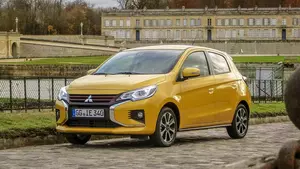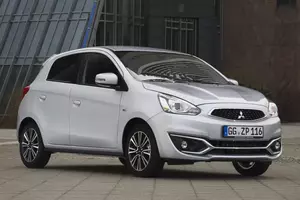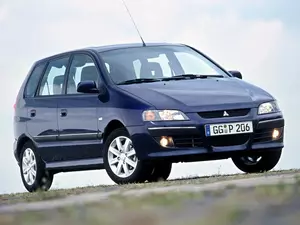
| Vehicle | Curb weight | Difference from world's smallest | Weight to power ratio | 0—60 mph acceleration ratio | Consumption ratio |
|---|---|---|---|---|---|
| 1.2 MIVEC |
905 kg / 1996 lbs |
480 kg (1059 lbs) heavier | 11 kg to 1 hp | 71 kg/s (157 lbs/s) | - |
| 1.0 MIVEC |
871 kg / 1921 lbs |
446 kg (984 lbs) heavier | 12 kg to 1 hp | 58 kg/s (128 lbs/s) | - |
| Vehicle | 1.2 MIVEC |
|---|---|
| Curb weight |
905 kg / 1996 lbs |
| Difference from world's smallest | 480 kg (480 lbs) heavier |
| Weight to power ratio | 11 kg to 1 hp |
| 0—60 mph acceleration ratio | 71 kg/s (157 lbs/s) |
| Consumption ratio | - |
| Vehicle | 1.0 MIVEC |
| Curb weight |
871 kg / 1921 lbs |
| Difference from world's smallest | 446 kg (446 lbs) heavier |
| Weight to power ratio | 12 kg to 1 hp |
| 0—60 mph acceleration ratio | 58 kg/s (128 lbs/s) |
| Consumption ratio | - |

| Vehicle | Curb weight | Difference from world's smallest | Weight to power ratio | 0—60 mph acceleration ratio | Consumption ratio |
|---|---|---|---|---|---|
| 1.0 MIVEC |
845 kg / 1863 lbs |
420 kg (926 lbs) heavier | 12 kg to 1 hp | 66 kg/s (146 lbs/s) |
201 kg/L (443 lbs/L) |
| 1.2 MIVEC |
870 kg / 1918 lbs |
445 kg (981 lbs) heavier | 11 kg to 1 hp | 71 kg/s (157 lbs/s) |
212 kg/L (467 lbs/L) |
| Vehicle | 1.0 MIVEC |
|---|---|
| Curb weight |
845 kg / 1863 lbs |
| Difference from world's smallest | 420 kg (420 lbs) heavier |
| Weight to power ratio | 12 kg to 1 hp |
| 0—60 mph acceleration ratio | 66 kg/s (146 lbs/s) |
| Consumption ratio |
201 kg/L (443 lbs/L) |
| Vehicle | 1.2 MIVEC |
| Curb weight |
870 kg / 1918 lbs |
| Difference from world's smallest | 445 kg (445 lbs) heavier |
| Weight to power ratio | 11 kg to 1 hp |
| 0—60 mph acceleration ratio | 71 kg/s (157 lbs/s) |
| Consumption ratio |
212 kg/L (467 lbs/L) |

| Vehicle | Curb weight | Difference from world's smallest | Weight to power ratio | 0—60 mph acceleration ratio | Consumption ratio |
|---|---|---|---|---|---|
| 1.6 |
1235 kg / 2723 lbs |
810 kg (1786 lbs) heavier | 13 kg to 1 hp | 108 kg/s (238 lbs/s) |
174 kg/L (384 lbs/L) |
| 1.8 16V |
1235 kg / 2723 lbs |
810 kg (1786 lbs) heavier | 11 kg to 1 hp | 127 kg/s (280 lbs/s) |
160 kg/L (353 lbs/L) |
| 1.8 GDI |
1240 kg / 2734 lbs |
815 kg (1797 lbs) heavier | 10 kg to 1 hp | 127 kg/s (280 lbs/s) |
170 kg/L (375 lbs/L) |
| 1.3 16V |
1170 kg / 2580 lbs |
745 kg (1643 lbs) heavier | 14 kg to 1 hp | 87 kg/s (192 lbs/s) | - |
| 1.9 DI-D |
1350 kg / 2977 lbs |
925 kg (2040 lbs) heavier | 13 kg to 1 hp | 118 kg/s (260 lbs/s) |
245 kg/L (540 lbs/L) |
| Vehicle | 1.6 |
|---|---|
| Curb weight |
1235 kg / 2723 lbs |
| Difference from world's smallest | 810 kg (810 lbs) heavier |
| Weight to power ratio | 13 kg to 1 hp |
| 0—60 mph acceleration ratio | 108 kg/s (238 lbs/s) |
| Consumption ratio |
174 kg/L (384 lbs/L) |
| Vehicle | 1.8 16V |
| Curb weight |
1235 kg / 2723 lbs |
| Difference from world's smallest | 810 kg (810 lbs) heavier |
| Weight to power ratio | 11 kg to 1 hp |
| 0—60 mph acceleration ratio | 127 kg/s (280 lbs/s) |
| Consumption ratio |
160 kg/L (353 lbs/L) |
| Vehicle | 1.8 GDI |
| Curb weight |
1240 kg / 2734 lbs |
| Difference from world's smallest | 815 kg (815 lbs) heavier |
| Weight to power ratio | 10 kg to 1 hp |
| 0—60 mph acceleration ratio | 127 kg/s (280 lbs/s) |
| Consumption ratio |
170 kg/L (375 lbs/L) |
| Vehicle | 1.3 16V |
| Curb weight |
1170 kg / 2580 lbs |
| Difference from world's smallest | 745 kg (745 lbs) heavier |
| Weight to power ratio | 14 kg to 1 hp |
| 0—60 mph acceleration ratio | 87 kg/s (192 lbs/s) |
| Consumption ratio | - |
| Vehicle | 1.9 DI-D |
| Curb weight |
1350 kg / 2977 lbs |
| Difference from world's smallest | 925 kg (925 lbs) heavier |
| Weight to power ratio | 13 kg to 1 hp |
| 0—60 mph acceleration ratio | 118 kg/s (260 lbs/s) |
| Consumption ratio |
245 kg/L (540 lbs/L) |